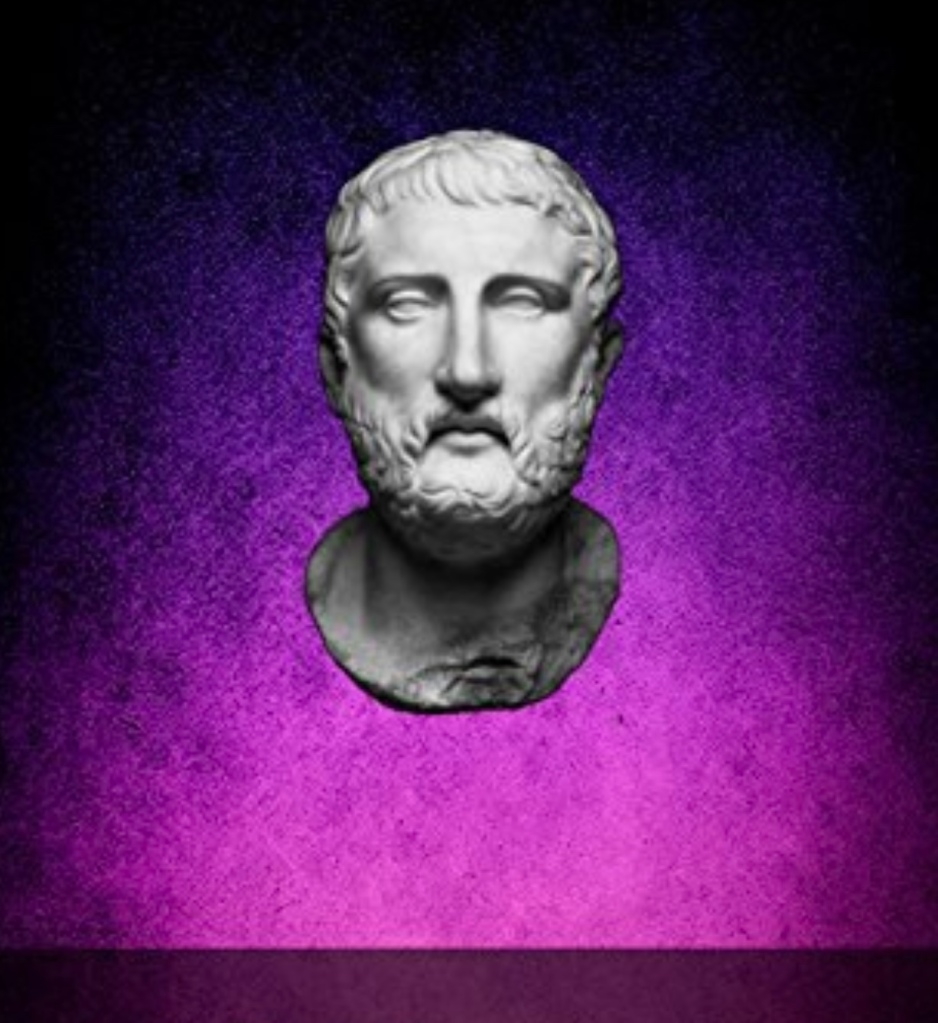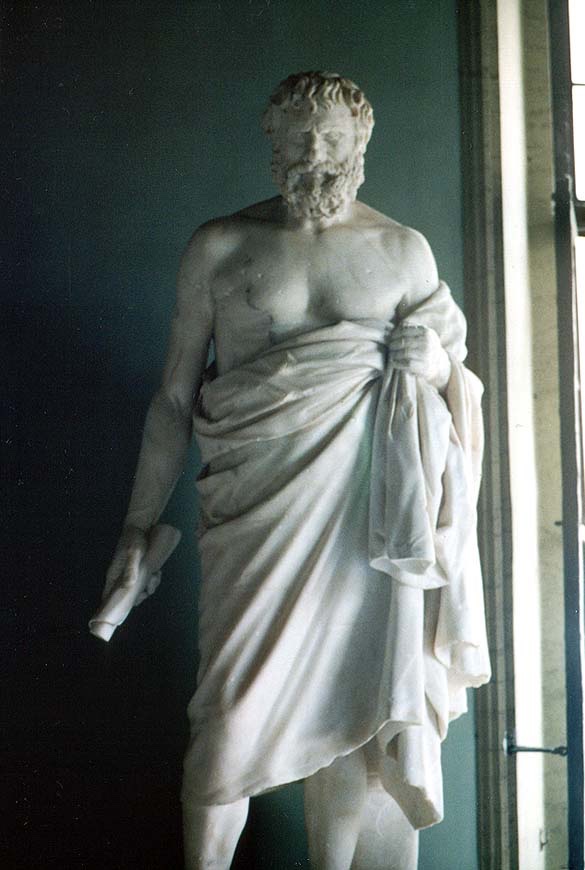“As you know, we dealt with each one of you like a father with his children, urging and encouraging you and pleading that you lead a life worthy of God, who calls you into his own kingdom and glory.” So the followers of Jesus in the community that had formed in Thessalonica in the early 50s of the first century would have heard, when a letter sent to them from Paul, Silvanus, and Timothy was read to them in their community gathering (1 Thess 2:11–12).
Ancient letters normally followed clear formulaic patterns (as,minded, modern letters do). They began by identifying the parties involved in a short opening address, followed by a prayer for their wellbeing. So in such letters, we often find something like “Publius to Demetrius, greetings; I pray you may be well”.
So it is no surprise that the letters we have in the New Testament reflect this pattern. Almost all of what we describe as “Paul’s letters” begin with a greeting from the writer to members of the church at the designated location. In one letter (Philemon), three individuals are named as the recipients (Philemon, Apphia and Archippus) as well as the whole church community. The three “pastoral letters” (1 Tim, 2 Tim, Titus) are addressed to an individual person.
It is often overlooked that seven of the letters specified co-writers along with Paul: Timothy (2 Cor, Phil, 1 Thess and Phlm; Col and 2 Thess), Sosthenes (1 Cor) and Silvanus (1 Thess and 2 Thess). Paul was the sole designated writer in only two “authentic” letters (Rom and Gal) and in four “debated” letters (Eph, 1 Tim, 2 Tim, Titus).
So “Paul’s first letter to the Corinthians” was actually “a letter from Paul and Sosthenes to the Corinthians” (see 1 Cor 1:1). And “Paul’s first letter to the Thessalonians”, which appears at the moment in the lectionary sequence for Pentecost 21A to 25A), was actually “a letter from Paul, Silvanus, and Timothy, to the church of the Thessalonians” (see 1 Thess 1:1).

This coming Sunday, the lectionary offers us an excerpt from this letter, from the place after the greetings and opening prayer (1:1–10), which we heard last Sunday. This is where we would normally expect the body of the letter to begin (2:1), exploring the matters of substance in the community that the authors wanted to raise with the recipients. However, Paul and his co-writers turn their attention at this point away from the community in Thessalonica, to focus more specifically on the way that they had been operating whilst they had been with the Thessalonians (2:1–12).
There are two striking matters to note in this section. The writers of this letter lay claim to behaving “like a father with his children” as they relate to the Thessalonians. This is unusual—although in other letters bearing his name, Paul does claim to be father to Timothy (Phil 2:22) and to Onesimus (Phlm 10).

Whilst all letters written in the name of Paul refer to God as Father (Rom 1:7; Gal 1:1–5; 1 Cor 8:6; Phil 4:20; Eph 4:6; and in other places), claiming a paternal relationship with those who are being addressed in the letter is unusual. In the case of the Thessalonians, it would seem that this claim rests on the fact that Paul and his fellow-missionaries were the ones who brought them to faith in Jesus.
“Our message of the gospel came to you not in word only, but also in power and in the Holy Spirit and with full conviction”, they declared (1 Thess 1:5), and so “we had courage in our God to declare to you the gospel of God in spite of great opposition” (2:2), and then “you became imitators of us and of the Lord” (1:6), as “you turned to God from idols, to serve a living and true God, and to wait for his Son from heaven, whom he raised from the dead—Jesus, who rescues us from the wrath that is coming” (1:9–10). This paternal glow at the response of these believers to the preaching of the three evangelists in Thessalonica is clear.
A second claim that is even more striking is the assertion that “we were gentle among you, like a nurse tenderly caring for her own children” (2:8). It’s a claim that is distinctive, in that the three male authors of this letter are using female imagery to describe their modus operandi whilst in Thessalonica.
Gentleness is not a quality often associated with evangelists or those called by God to proclaim “the word of the Lord” to the people, although one proverb does state that “a gentle tongue is a tree of life” (Prov 15:4) and the prophet Jeremiah notes that when his life was threatened by the people of Anathoth, “I was like a gentle lamb led to the slaughter” (Jer 11:19). Gentleness is seen as a sign of “the righteous man” in the Wisdom of Solomon 2:19.
The claim to be “gentle as a nurse” comes, as we have noted, in the context of describing, in some detail, the way in which those who proclaimed the good news in Thessalonica were operating while they had been with the Thessalonians (2:1–12).

As they write to the Thessalonians, the authors of this letter feel the need to defend themselves, pointing out that their motivation in proclaiming the gospel was not based on “deceit or impure motives or trickery” (2:3), nor did they speak “with words of flattery or with a pretext for greed” (2:5). Rather, they undertook their task with deep-seated care (2:8) and purity of motive (2:10).
The three writers invoke the divine no less than nine times in twelve verses, proclaiming that the methods used were “approved by God” and that the spoke only “to please God” (2:4). Their invocation of God serves to underline the truth of what they write, and what they have said and done, with the Thessalonians.
The language which Paul, Silvanus, and Timothy use in this part of the letter is reminiscent of discussions of rhetoricians and philosophers of the time, a number of whom were accused of having base motives, an interest in self-promotion and a desire for immediate financial rewards!
The three who were writing to the Thessalonians could well have been accused of functioning in such a self-serving way, especially if their modus operandi was seen to be very similar to those wandering preachers of philosophical messages—deceitful, self-serving, using flattery and trickery, seeking financial gain. The power of their words (1:5; 2:12) could have fuelled such a critical perspective of their activities.
In addition, the itinerant way of life adopted by Paul, and his various companions, could easily leave them open to such a criticism. Yet, how Paul and the others defend themselves is similar to the way that the better class of philosophers and rhetoricians of the day tried to defend themselves. We know about this through the writings of pagan philosophers who canvassed the different types of itinerant philosophers that were known at the time.
In particular, the writings of Dio Chrysostom are relevant and helpful in this regard. Dio was an orator of the second century, but the phenomena that he described had been in existence for decades before. We can assume, with a reasonable degree of confidence, that his words describe a phenomenon akin to what was happening in the first century.

In the 32nd discourse of Dio Chrysostom, delivered “to the people of Alexandria”, he talks about a range of people who wandered from village to village, spruiking their own moral teachings. (In what follows I am quoting from the translation of Dio’s Oration 32 by J.W. Cohoon and H. Lamar Crosby in the Loeb Classical Library.)
First, Dio refers to a class of rather undesirable people; itinerants “whose tenets, to be sure, comprise practically nothing spurious or ignoble, yet who must make a living”. He describes them as Cynics, noting that “posting themselves at street-corners, in alley-ways, and at temple-gates, [they] pass round the hat and play upon the credulity of lads and sailors and crowds of that sort, stringing together rough jokes and much tittle-tattle and that low badinage that smacks of the market-place”.
His assessment is that “they achieve no good at all, but rather the worst possible harm, for they accustom thoughtless people to deride philosophers in general, just as one might accustom lads to scorn their teachers, and, when they ought to knock the insolence out of their hearers, these Cynics merely increase it”.

from the Capitoline Museums in Rome.
Dio then notes that such people come “in the guise of philosophers” but that “they do these things with a view to their own profit and reputation, and not to improve you”. He declares that this is “shocking; for it is as if a physician when visiting patients should disregard their treatment and their restoration to health, and should bring them flowers and courtesans and perfume”.
He then moves on to describe “only a few who have displayed frankness in your presence, and that but sparingly, not in the same way as to fill your ears therewith nor for any length of time; nay, they merely utter a phrase or two, and then, after berating rather than enlightening you, they make a hurried exit, anxious lest before they have finished you may raise an outcry and send them packing, behaving in very truth quite like men who in winter muster up courage for a brief and hurried voyage out to sea”.
“But to find a man”, Dio continues, “who in plain terms and without guile speaks his mind with frankness, and neither for the sake of reputation nor for gain makes false pretensions, but out of good will and concern for his fellow-men stands ready, if need be, to submit to ridicule and to the disorder and the uproar of the mob — to find such a man as that is not easy, but rather the good fortune of a very lucky city, so great is the dearth of noble, independent souls and such the abundance of toadies, mountebanks, and sophists”.
And then, he puts forward his own situation, calling on the (unidentified) deity whom he worships: “I feel that I have chosen that rôle, not of my own volition, but by the will of some deity”, and he concludes by affirming that “when divine providence is at work for men, the gods provide, not only good counsellors who need no urging, but also words that are appropriate and profitable to the listener”.
As Dio has explained his own mode of operating, in contrast to the imperfect and self-serving ways of others, so too Paul, Silvanus, and Timothy are pressing their case, using similar language and concepts to articulate their cause. They present as called by God, speaking to please God, eschewing morally questionable practices, and sharing their very lives with their audience. The similarities are striking.
These similarities are explored in detail in the Anchor Bible Commentary on 1 Thessalonians by Abraham Malherbe. There is a good summary of Malherbe’s analysis of 1 Thess 2 in this vein, at http://www.religion.emory.edu/faculty/robbins/SRI/Examples/textures/inter/echo2.cfm The initial article in Novum Testamentum (1970) in which Malherbe argued this case can be read at https://library.mibckerala.org/lms_frame/eBook/atla0000721845%20Cynic%20Background.pdf
I confess to having a clear bias in regard to this line of interpretation; Abe Malherbe was my doktorvater, the supervisor of my doctoral thesis, on hellenistic apologetics, Josephus, and Luke-Acts, at Yale University. Before that, I took classes with him during my coursework year, including an exegesis class on “Paul’s Macedonian Correspondence” (1 and 2 Thessalonians and Philippians), and I participated in a doctoral seminar on “Paul and the Moral Philosophers”—so I am well-schooled in the details of his case; and in full agreement with his view on this particular matter. (There were other exegetical matters in which we disagreed; the papers I wrote to argue against Malherbe’s views were nail-biting pieces, as he could be a fierce critic, as well as a warm encourager, on such matters.)

